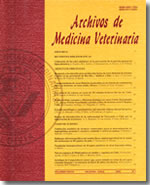Inter-population breeding in Mytilus chilensis, an economically important bivalve, and its effects on the shell length during the larval stage
Main Article Content
Abstract
Two geographically separated natural populations of Mytilus chilensis were utilized to carry out the experimental crosses on the present study. In every crossing, using the factorial design with replication, fertilization of eggs occurred without detection of significant differences among inter and intra-population crosses in relation to percentage of eggs developed into larvae at day 4 (P > 0.05). However, the percentage of abnormal larvae at day 4, was significantly higher among inter-population crosses (P < 0.05). The larvae from each cross were placed into a 200 l fiber-glass tank containing 1 µm filtered and U.V. treated fresh sea water, at a density of 100 larvae per ml. A high cell concentration of the micro algae Isochrysis galbana was used as food. Samples for analyzing larval growth were taken from the larval cultures at 4, 10 and 20 days after fertilization. Larval samples were videotyped from a plankton decantation chamber in an inverted microscope fitted with a Pulnex video camera. Selected images were captured for subsequent processing and measurement of each larva using a Scion Image 3.0b PC Software. Significantly differences (P < 0.05) were found in the size of the larvae among the experimental crosses. The sibs from inter-population crosses showed significantly (P < 0.05) higher sizes than those produced by the intra-population crosses. These higher values in the shell length of inter-population juvenile mussels may suggest the presence of heterosis.

